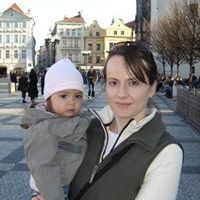Petra Ezzeddine
Charles University, Prague, Faculty of Humanities, Faculty Member
Research Interests:
Motherhood at distance. Transnational motherhood of Ukrainian migrants in the Czech Republic Abstract: The Czech Republic is chosen by Ukrainian transnational mothers as a destination for their economic migration, mainly because it is... more
Motherhood at distance. Transnational motherhood of Ukrainian migrants in the Czech Republic Abstract: The Czech Republic is chosen by Ukrainian transnational mothers as a destination for their economic migration, mainly because it is possible, due to the geographical distance, to conduct a circulation migration between the two countries. The life “here“ and “there“ and the mobility of female labor migration gives, on the one hand, Ukrainian mothers the possibility of coordinating productive and reproductive work but, on the other hand, they are “trapped“ in the net of unskilled work, and it is hard for them to get a stable job position. I analyze how gender operates in transnational spaces, and what impacts it has on the experience of motherhood. I describe how transnational Ukrainian mothers narratively construct and emphasize their experiences with transnational motherhood.
Research Interests:
Research Interests:
Research Interests: Art and Political Science
Research Interests:
Research Interests:
This paper seeks to analyse the material and social practices of Ukrainian transnati-onal mothers-female domestic workers-who are living and working in the Czech Republic. The author focuses on the specifi c emotional nature of domestic... more
This paper seeks to analyse the material and social practices of Ukrainian transnati-onal mothers-female domestic workers-who are living and working in the Czech Republic. The author focuses on the specifi c emotional nature of domestic work-precarious working conditions and interactions with employers-which has become an important source of their income. In the second part of the paper, the author focuses on the social and sentimental signifi cance of material objects (gifts) and remittances for the experience and practice of trans-national motherhood. She explains how the consumption of remittances for their children works as an important strategy for transnational mothers to effectively identify and maintain their maternal role in the transnational social environment. She argues that this specifi c com-modifi cation of motherhood not only refl ects the transformation of maternal practices (both of female employers and migrant women) in late capitalism, but also refl ects gender, social, and other inequalities in the context of two transforming post-socialist societies.
Research Interests:
Research Report
Research Interests:
-kapitola ze Stínové zprávy o genderové rovnosti , Praha: Česká ženská lobby (2015)
Research Interests:
he Czech Republic is in the process of transforming its social system which is not capable of managing adequate care of its old citizens. In the last years we have witnessed an increase in the number of mediating agencies that import... more
he Czech Republic is in the process of transforming its social system which is not capable of managing adequate care of its old citizens. In the last years we have witnessed an increase in the number of mediating agencies that import mainly Ukranian migrants for the purpose of engaging them in care work focusing on elderly people. The paper presents results of pilot ethnograpic research and focuses on commodification of care work for elderly people and the vulnerable character of domestic care work provided by Ukrainian female migrants in the Czech Republic. I argue that this specific “product” – the Ukrainian female caregiver – is based on the intersections of gender, ethnicity and migration.
Research Interests:
he paper focuses on the social situation and social practices of female care migrants (at the age of 50 and above) from the South Moravia (the region of Mikulov, Břeclav) who migrate for work to Austria as domestic workers-caregivers for... more
he paper focuses on the social situation and social practices of female care migrants (at the age of 50 and above) from the South Moravia (the region of Mikulov, Břeclav) who migrate for work to Austria as domestic workers-caregivers for seniors at regular intervals (circular migration). The main aim of the text is to argue that translocal female migrants paradoxically perceive their labour migration as a specific form of emancipation, despite the fact that they work in the so-called live-in-service jobs (where they live and work in private households) and often experience indignity. While in Austria they work in gendered and very demanding jobs with low wages, circular care migration provides them with the possibility to extend their gender power in the transforming Czech society. There is thus a paradox in that while they are marginalized in Austria, they are empowered on the Czech side of the border. This is achieved through paid reproductive work and better access to income, which leads to personal consumption based on their own interests and overall personal benefit. Special attention is paid to new forms of translocal care chains and new forms of these women’s partner cohabitation (living apart together).
Research Interests:
The Czech Republic is chosen by Ukrainian transnational mothers as a destination for their economic migration, mainly because it is possible, due to the geographical distance, to conduct a circulation migration between the two countries.... more
The Czech Republic is chosen by Ukrainian transnational mothers as a destination for their economic migration, mainly because it is possible, due to the geographical distance, to conduct a circulation migration between the two countries. The life “here” and “there” and the mobility of female labour migration gives on the one hand Ukrainian mothers the possibility of coordinating productive and reproductive work, but on the other hand they are “trapped” in the net of unqualified work, and it is for them hard to obtain a stable job position. I will analyse how gender operates in transnational spaces, and what impacts it has on the experience of motherhood. I will try to describe how transnational Ukrainian mothers narratively construct and emphasise their experiences with transnational motherhood.
